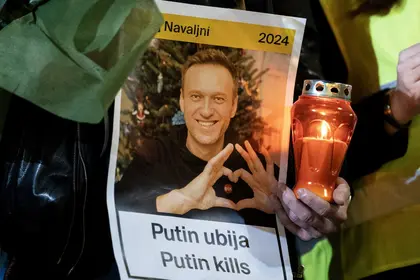The body of Russian opposition leader Alexei Navalny has been handed to his mother more than a week after he died in an Arctic prison colony, his team said on Saturday.
Navalny, President Vladimir Putin's most prominent critic, died on February 16 in one of Russia's toughest prisons in northern Siberia.
JOIN US ON TELEGRAM
Follow our coverage of the war on the @Kyivpost_official.
He was serving a 19-year sentence on charges denounced by Putin's critics as political retribution for his opposition activity.
"Alexei's body was handed over to his mother," a spokesperson for Navalny's team, Kira Yarmysh said on X, formerly Twitter. "Many thanks to all those who demanded this with us."
For a week, Russian officials had refused to give Lyudmila Navalnaya custody of her son's body.
She had travelled to the town of Salekhard in the Yamalo-Nenets region, the nearest settlement to the prison colony where Navalny died, to recover it.
On Friday, Navalny's team said they had filed a lawsuit to obtain the body. They accused local officials of having threatened to bury him on the prison grounds if his mother did not agree to a "secret" funeral.
On Saturday, plans for the funeral were still unclear, Yarmysh wrote on X.
"Lyudmila Ivanovna is still in Salekhard. The funeral is still pending," she wrote.
"We do not know if the authorities will interfere to carry it out as the family wants and as Alexei deserves."
His team has already argued that the Kremlin is trying to block a public funeral, which could turn into a show of support for Navalny's movement and his opposition to Putin.

Fico’s Coalition Critically Weakens as More MPs Withdraw Support – for Now
The Russian leader, who famously never said Navalny's name in public, has not commented on the death of his most vocal critic.
His spokesman, Dmitry Peskov, has criticised statements by Navalny's wife and Western leaders blaming Putin for his death as "vulgar".
- 'Satanism' -
Russian authorities said Navalny died of "natural causes" after he lost consciousness following a walk in the prison colony, nicknamed "Polar Wolf".
His team denounced officials' initial refusal to release his body -- their refusal for days to let his mother even see it -- accusing them of trying to "cover their tracks".
G7 leaders, in a statement Saturday praising Navalny's "life fighting against the Kremlin's corruption" also called for the truth.
"We call on the Russian government to fully clarify the circumstances around his death," said the statement from the G7 nations: the United States, Japan, Germany, France, Britain, Italy and Canada.
Tens of thousands of Russians had signed a petition calling for Navalny's body to be released. Dozens of high-profile Russian cultural figures published video messages urging the same.
Earlier Saturday, Yulia Navalnaya continued her attack on Putin for what she said was his role in her husband's death and the initial refusal to release his body.
"You tortured him alive, now you torture him while he is dead," Yulia Navalnaya said in a video posted Saturday.
"What Putin is doing now is hatred. No, not even hatred, it's some kind of satanism," she added.
She has vowed to continue her husband's work.
Navalny's death came after three years of being held in Russian prisons.
It triggered uproar among the country's opposition and Western leaders, and impromptu protests in cities around Europe.
Inside Russia itself, police have arrested hundreds of mourners at makeshift memorials to Navalny over the last week, with more than 150 receiving short jail terms.
On Saturday, Canadian Prime Minister Justin Trudeau added his voice to those pointing the finger at the Kremlin.
"Putin pretends to be powerful, but truly powerful leaders do not assassinate their opponents," Trudeau told journalists in Kyiv.
Navalny shot to prominence through his anti-corruption campaigning, exposing what he said were the ill-gotten gains of Putin and his entourage in slick YouTube films that racked up millions of views.
He was arrested in January 2021 when he returned to Russia after being treated in Germany for a poisoning attack he suffered while campaigning against Putin in Siberia months earlier.
From jail, he continued to campaign against corruption inside Russia, but was forced to watch on helplessly as Putin invaded Ukraine, imprisoned his allies and forced others into exile.
You can also highlight the text and press Ctrl + Enter










